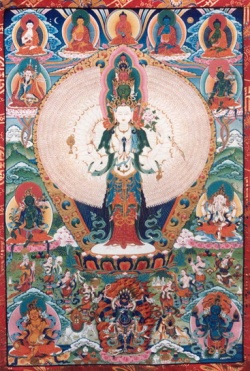Difference between revisions of "Avalokiteśvara"
Jump to navigation
Jump to search
| Line 15: | Line 15: | ||
In the [[Theravada]] [[tradition]] of {{Wiki|Southeast Asia}}, [[Avalokiteśvara]] is known as '''[[Lokesvara]]''' ("[[Lord of the World]]"). [[Tibetan Buddhism]] also relates [[Chenrezig]] to the foremost [[mantra]], the six-syllable ''[[Om Mani Padme Hum]]''. [[Thus]] [[Chenrezig]] is also called [[Shadakshari]] ("[[Lord of the Six Syllables]]"). | In the [[Theravada]] [[tradition]] of {{Wiki|Southeast Asia}}, [[Avalokiteśvara]] is known as '''[[Lokesvara]]''' ("[[Lord of the World]]"). [[Tibetan Buddhism]] also relates [[Chenrezig]] to the foremost [[mantra]], the six-syllable ''[[Om Mani Padme Hum]]''. [[Thus]] [[Chenrezig]] is also called [[Shadakshari]] ("[[Lord of the Six Syllables]]"). | ||
| − | The ''[[Maha Karuna Dharani]] [[Sutra]]'', also known as the [[Great Compassion]] [[Mantra]], includes the 82 syllable [[mantra]] spoken by [[Avalokiteśvara]] to the assembly of [[Buddhas]] and [[Bodhisattvas]], and extols the [[merits]] of [[chanting]] the [[mantra]]. This [[mantra]] is popular in [[China]], [[Japan]] and {{Wiki|Taiwan}}. | + | The ''[[Maha Karuna Dharani]] [[Sutra]]'', also known as the [[Great Compassion]] [[Mantra]], includes the 82 {{Wiki|syllable}} [[mantra]] spoken by [[Avalokiteśvara]] to the assembly of [[Buddhas]] and [[Bodhisattvas]], and extols the [[merits]] of [[chanting]] the [[mantra]]. This [[mantra]] is popular in [[China]], [[Japan]] and {{Wiki|Taiwan}}. |
{{R}} | {{R}} | ||
[http://www.mauspfeil.net/Avalokite%C5%9Bvara.html www.mauspfeil.net] | [http://www.mauspfeil.net/Avalokite%C5%9Bvara.html www.mauspfeil.net] | ||
| Line 21: | Line 21: | ||
| − | ==Articles containing word "Avalokiteśvara,Avalokiteshvara" in title== | + | ==Articles containing [[word]] "Avalokiteśvara,Avalokiteshvara" in title== |
<DPL> | <DPL> | ||
redirects = include | redirects = include | ||
